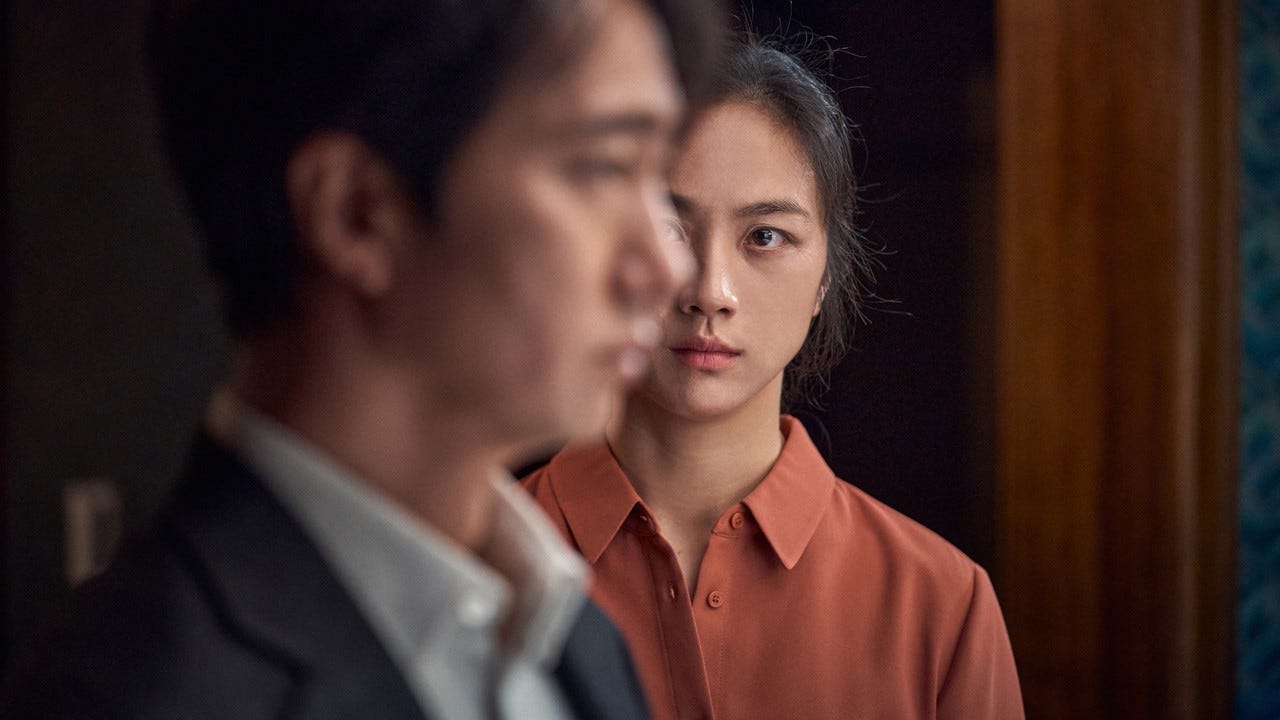Decision to Leave
Park Chan-wook's latest is both sumptuous romance and mistifying mystery, draped in gorgeous atmosphere.
It often goes overlooked how much your interpretation or appreciation of a movie can be dictated by what you bring to it.
Unfortunately, I was not in the proper state to bring much to this movie. I wasn’t sad, angry, drunk, or high; my brain simply wasn’t in “focus and absorb” mode. After a big week and a bigger weekend, it was in “I need a break” mode.
Decision to Leave, for all of its lovely qualities, is anything but the cinematic equivalent of a break.
So I’ll just preface this review by telling you that it will be largely uninsightful ramblings about a movie that I:
greatly enjoyed,
even more thoroughly admired, but
didn’t entirely understand, and
have hardly begun to digest.
Suffice to say that my true feelings on the film won’t really be deciphered until I see it again, which I intend to do soon.
South Korean master Park Chan-wook’s latest film is one of heavily-bent genre trappings and gorgeous visual storytelling; a neo-noir mystery romance drama with endless room for interpretation.
Detective Jang Hae-joon (Park Hae-il) is attempting to solve a murder. A death, really, as it seems at first to be an open-and-shut climbing accident. A seasoned rock climber in Busan has plummeted to his death, down the sheer face of one of his favorite cliffs. His wife, Seo-rae (Tange Wei), seems particularly unfazed by the news.
Hae-joon returns home for the weekend to be with his own wife, with whom he shares a relatively cold marriage. It’s clear in her feeble attempts to spark new interest that things have been this way for awhile. As he fills her in on his latest case, she submits that the rock climber’s wife must have something to do with his death.
Surely not, Hae-joon would like to think, but, perplexed, he sets about his investigation anyway. Late-night stakeouts are his specialty, as they pair well with his insomnia. So when he returns to Busan for the work week, he begins setting up in alleys, parking lots, and rooftops outside Seo-rae’s apartment, binoculars glued to his face, waiting for evidence of guilt. What he finds more quickly is an infatuation.
The easiest takeaway for me is the film’s atmosphere. Even through my mental haze, I could sense the thick, sumptuous mood Park was inundating me with. Kim Ji-yong’s cinematography and Kim Sang-beom’s editing are brilliant achievements in their own right, making this one of the year’s prettiest and most seductively moody pictures. Their expert work is deftly combined by Park with his and Chung Seo-kyung’s elegant and elusive script to weave the will-they-won’t-theyest movie in recent memory.
In fact, one of my favorite methods of executing this mood is Park’s integration of the camera into the narrative. Hae-joon’s voyeuristic, telescopic perspective transports him (quite literally, on-screen) into Seo-rae’s apartment. He sits with her and observes her every gesture, every breath. Hae-joon is intoxicated by this fantasy.
Eventually, he crosses paths with Seo-rae in a more tangible sense, throwing his mental acuity and faculties of reason into chaos. Calling her in for interrogation precipitates palpable tension across the table, and the mental dance begins.
Park Hae-il and Tang Wei engage in this psychosexual tango with cool, subtle coyness. Tiny gestures go a long way in communicating their thoughts about one another. Park Chan-wook employs this back-and-forth to dizzying degrees, making you question whether it’s their body language betraying their true intentions, or your eyes and expectations deceiving you.
Even to the last, Park refuses to be concrete, leaving you to ponder on how the things you just witnessed actually happened. Kim’s editing enforces this uncertainty, cutting at decisively unsatisfying moments and playing with sequence of events so as to inflict upon you the fog of seduction clouding Hae-joon’s mind.
In some ways, my groggy brain felt well-suited for the environment Park and crew were creating in front of me. Just as Hae-joon couldn’t parse dream from reality, so could I not parse meaning from distraction. Granted, I still think there were lots of signs Park was throwing me that I couldn’t pick up on in my stupor, but I also fully expect to retain some of that mystified feeling on a rewatch, as I believe it was fully Park’s intent.
Decision to Leave is a complex picture, as rich in re-interpretations as it is in dreamlike atmosphere. Though I wasn’t able to bring the tools necessary to make satisfactory interpretations for myself, it’s apparent Park designed the film to be continually revealing on rewatch, even if you’re able to experience it with a clear mind from the start.





Once again, I will see this movie based on your review. I have never regretted seeing a film you recommend!!!